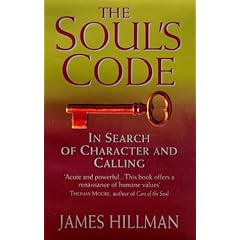James Hillman's elitism
I've been reading James Hillman's book, The Soul's Code. I've been eager to read some of Hillman's work, because he's the only contemporary psychologist, as far as I can tell, who puts forward a daemonic theory of the personality - that's to say, he seems to believe that we each have a daemon who directs us on our journey through life.
I agree with that idea, mad though it is. That's basically what the book I wrote, The Wild Man, is about. It's about my encounter with a daemon figure in various dreams and nightmares, and how this daemon figure has appeared to various other writers and artists throughout history (Augustine, Flaubert, Dickens, Tom Wolfe, loads of them really).
So actually, I guess my theory is slightly different - I believe that, as Plato suggested, daemons are messengers from the gods, or the Cosmic Mind, or whatever, and they appear to certain people who have to try and communicate their message to society, usually in times when society has got out of balance with the gods. Krazee, huh?!!
Anyway, I don't want to talk today about the daemonic theory of psychology, fascinating as it is. What struck me most about the book, in fact, was its elitism.
What amazed me was that every single 'case-study' that Hillman produced to support his idea that we each have a daemon or 'calling' was a famous and extremely successful artist or public figure.
So he supports this theory of calling by looking at the lives of: Judy Garland, Ella Fitzgerald, the bullfighter Manolete, Yehudi Menuhin, Eleanor Roosevelt, Rommel, Jackson Pollock, RD Laing, Franco, Sigmund Freud...
He draws, in other words, exclusively on geniuses for his theory of human personality. These people might have had personality problems in their youth, they might have been difficult or bored at school, but really this was just their genius calling to them.
Then, later in life, their genius flowered in their literature, or their political career, or their art. The great work they produced justified all that had gone before.
It's an attractive theory. I guess we could call it the 'Good Will Hunting' school of psychology. Inside every one of us there is a genius trying to get out, and all it needs is the right coaching or therapy, and we will flower, and do such things as will make the world wonder. All of the suffering and anxiety will be redeemed by the Great Work that we will do.
But I have two main probems with this theory.
Firstly...not everyone's a genius! How can Hillman put forward a theory of human personality which relies exclusively for its data set on geniuses, who by their very nature are rare and extraordinary humans?
Geniuses are usually distinguished from the rest of us precisely by their sense of calling, their daemonic drive to work in some particular area, their uncanny and prodigal ability in this area from an early age. That's why we call them geniuses, because their powers and abilities seem to come through them, as if from some higher spiritual source, rather than from them.
But the other 98% of us don't have this calling. We don't have these prodigious abilities. We're just mediocre, average people, perhaps even below the average level of education or IQ, and yet we're still struggling with mental illness, struggling with depression or anxiety or stress or addiction.
What can Hillman's theory do for such people, for the millions of ordinary people suffering out there, who are unlikely ever to be redeemed by some great work of genius?
Secondly, I don't like the idea that someone with mental illness 'proves their value' by creating some great work. Jungians and Freudians often accuse CBT of being capitalist, but actually, that's a completely capitalist idea - you're only worth as much as the work you produce. So if you die just before you finish your 'Great Work', does that mean you are worth less, as a human being? If you are a bad novelist, does that make you worth less as a human being? Who's to judge the value of your work, let alone the 'value of you'?
So those are my two principal objections to Hillman's work - it seems to me a persuasive account of the 2% of the human race who are geniuses (or is it genii?), but not nearly as applicable or useful for the billions of mediocre but loveable masses who make up the human race, who aren't that smart, who aren't that gifted, who are unlikely ever to produce a Great Work.
It's an elitist theory of psychology, in other words, designed to appeal particularly to the upper middle classes, but not much use at all at the cliff-face of mass mental illness, mass depression, mass anxiety. You can't start from the genius and work down to the rest of us. You have to start from the ordinary, the unexceptional, the typical. Because a great deal of mental illness is simply typical, unexceptional, repetitive, even boring. Ordinary, everyday hell.
The psychologist can't just concentrate on the wealthy, the gifted and the powerful- those, perhaps, who need our help least of all. He or she should try to help in particular the poor, the inarticulate, the unblessed.

